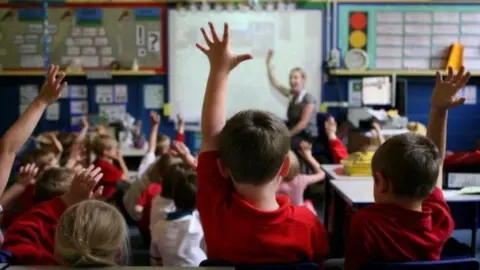Coronavirus: Union 'will sue' if teachers put in danger
 PA Media
PA MediaNI's largest teaching union has said it will consider legal action if teachers are put in danger of contracting Covid-19 when they return to work.
Justin McCamphill from NASUWT said NI was "not ready" to send children back five days a week.
On Thursday, it was announced that all pupils will return to school full-time from next term.
Schools will be required to keep most pupils in whole-class "bubbles" to limit mixing.
The Education Minister, Peter Weir, has said that guidance to help schools operate safely will be published next week.
However, unions have expressed concerns about the safety and viability of the plan.
Mr McCamphill, whose union represents 11,000 teachers across NI, told the BBC's Nolan Show his union was "prepared to take action against schools that endanger our members".
"We have said that if the risk assessment shows that it is not safe, that schools should not proceed with the full reopening," he said.
"If they do, when the risk is there, and if our members are impacted by coronavirus we will be taking legal action against those individual schools," he added.
He said unions would sue "if they [schools] have acted negligently and members' health and well being is impacted".
He said the executive still had time to reconsider.
'Petri dish'
"Other countries that have had successful returns have done it with social distancing," he told the programme.
"The plan we have has thrown social distancing out the window," he said, adding that he had written to the authorities pointing that out.
He said teachers, parents and pupils all need "confidence" to return to school and this was something they did not yet have.
He said one parent had told him they did not want to sent their child into a "Petri dish".
"We had a plan in place with consultation and we were prepared to stand over it. The safest way to go about this is to implement what schools have been planning for," he said.
Responding to Mr McCamphill's comments, the education minister said that revised guidance will be published next week to "help schools operate safely."
"Effective processes for managing local outbreaks, including the PHA's test, trace, protect programme, are essential measures to allow a full reopening of schools," said Mr Weir.
"I am confident that our school leaders and staff will rise to the challenge and ensure all pupils can return safely to education full-time," he added.
He urged parents and pupils to be "vigilant and act responsibly within the overarching public health guidelines".
"Parents if your children have symptoms please keep them at home and arrange a test," he said.
The guidance will continue to be reviewed in response to any changes in the public health position.
 Pacemaker
PacemakerEarlier, Northern Ireland's Chief Scientific Advisor, Prof Ian Young, told the Nolan Show children were "much less likely to become very ill, were much less to susceptible to getting it" and "significantly less likely to pass it [coronavirus] along than adults".
"We have looked very carefully at experience in other countries as quite a few have reopened over the last few months and, in most cases, the impact on transmission has been pretty limited, though there have been exceptions," he said.
He used the example of Israel, where the opening of schools appeared to be associated with an upturn in the epidemic.
"That's very much a minority," he added.
It was "inevitable" that there will be some cases associated with outbreaks in schools but that it would be monitored closely.
Schools in Northern Ireland were closed in March due to the coronavirus pandemic.
The executive passed a proposal from the minister at their meeting on Thursday. It includes a return to school for those who attend special schools.
Pupils going into years seven, 12 and 14 are to return to school on 24 August with all other pupils returning from 31 August.

What's going to change in schools?
In a letter to principals, Education Minister Peter Weir said that previous advice requiring social distancing of 1m (just over 3ft) in classes would change.
"Strict social distancing requirements between all pupils will be relaxed from a specific distance to the best spacing that can be achieved but will remain in place between adults and, as far as it is practicable, between adults and pupils," he said.
"Schools should continue to implement as much social distancing as is practical and where physical capacity and curriculum delivery permit.
"On the return to school, the overriding provision will be a full-class return with all appropriate and practical protections put in place."
However, whole-class "bubbles" will be required for most pupils to limit mixing.
"A class will act as a single consistent group or bubble, with minimal prolonged interaction with other classes within the school," he said.
However, arrangements for post-primary pupils in years 11-14 will differ as pupils will need to move between classrooms depending on what subjects they are studying.
The minister said that updated guidance on reopening would be issued to schools next week by the Department of Education (DE).
The need for "bubbles" will mean that most pupils should stay in their own class groups for the entire school day and not mix with pupils in other classes.
In many schools that will mean measures like:
- Staggered starts and ends to the school day
- Staggered meal and break times so children are not mixing in the playground
- School meals may have to be eaten in classrooms or even outside
- One-way systems in school corridors
- Children may not be able to bring things like books or stationery home and then back to school
- Items such as Lego and soft toys that are difficult to clean are likely to disappear from classes

